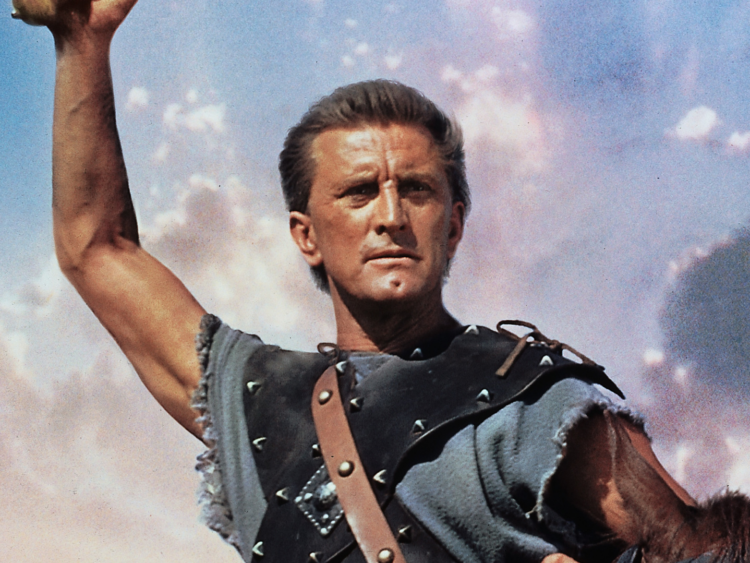On October 6th, 1960, the world was introduced to Spartacus .
The story of a soldier sold into slavery; a slave who became a gladiator. And finally, the tale of a general who threatened to overthrow an empire . It’s an iconic tale and it was told beautifully.
Let’s celebrate this monumental film together and check out these 10+ Spartacus behind-the-scenes secrets that fans didn’t know!
It was a race to the finish line!
Yul Brynner and Anthony Quinn were on deck to make a movie with United Artists called Spartacus and The Gladiators .
The only snag was that Kirk Douglas’ film company owned the rights to the novel by Howard Fast . Universal ended up backing Douglas, and the Brynner/Quinn project was canned.
Peter Ustinov and Kirk Douglas didn’t meet until their first scene.

It seems a little strange to not introduce yourself to a colleague, but who am I to critique the method of one of the greatest film actors of all time?
Ustinov has said that he didn’t recognize Kirk, due to the fact that he looked so grungy.
Laurence Olivier wore a fake nose.

According to Peter Ustinov, it wasn’t all that different from Olivier’s real nose.
But for some reason, it helped the actor feel more comfortable and less self-conscious. Clearly, it worked — so who am I to judge?
According to novelist Howard Fast, Kirk Douglas begged for his help.
Fast was a little sore that Kirk wasn’t a fan of his first screen adaptation .
He recalled how before he arrived on set, all they had was pieces of the film but no connected story.
Kirk Douglas had to shut down production for 10 days because he had the flu!

As Kirk describes it, this was the first time in his career that he wasn’t able to answer the call of duty.
According to his doctor, exhaustion and stress were the main culprits.
The Spartans helped *Spartacus*.
In order to capture the roar of the Roman Coliseum, the film’s creative team looked to the Michigan State Spartans for help.
They gathered 76,000 fans in the stands and had them scream lines like “Hail, Caesar,” and “Spartacus!”
Art director, Eric Orbom, never got to see the film on the big screen.

Sadly, Eric suffered a fatal heart attack and passed away. His work and legacy, however, will live on forever.
Eric was awarded a posthumous Academy Award for Best Art Direction.
Stanley Kubrick wasn’t the first choice to direct the film.

Originally, Kirk Douglas was after David Lean but he declined. In pure Stanley Kubrick fashion, the infamous director immediately began rubbing people the wrong way.
He clashed so hard with the cinematographer, Russel Metty, that Kubrick wound up shooting the majority of the movie by himself.
*Spartacus* was written by Dalton Trumbo!

Dalton Trumbo is one of the greatest screenwriters of all time. But in the late 1940s, he got himself blacklisted from Hollywood for refusing to testify before the House Un-American Activities Committee.
Trumbo was going to write under a pseudonym, but Kirk Douglas insisted that Trumbo be given full name credit.
Anthony Hopkins did voicework for the remastered 1991 version of *Spartacus*.
For the release of the restored version, additional footage was added to the film. Voicework needed to be done but Laurence Olivier had passed away by this point.
Anthony Hopkins was brought in to do his very best Laurence Olivier impression.
Spartacus really existed.
It’s hard to separate facts from legend but we do know that Spartacus’ revolt occurred in the year 73 BCE. He, along with 70-odd gladiators, escaped from their confines in Capua and took refuge on Mount Vesuvius.
At its peak, Spartacus was commanding an army of slaves that was more than 120,000 strong.
At the time, it was the most expensive movie ever made in Hollywood.

The total budget for Spartacus came in at just over $12 million.
Adjusting for inflation at an annual rate of 3.68%, the budget for Spartacus in 2020 would be worth just shy of $105 million.
Stanley Kubrick disowned *Spartacus*.

Before Stanley Kubrick gave his blessing for “The Stanley Kubrick Collection” to be released, he insisted that three films not be included.
He cited Spartacus due to the fact that it was littered with examples of studio tampering. He vowed to never again work without full creative control.
Charles Laughton and Laurence Olivier didn’t like each other.

At the time, they were perhaps the two greatest thespians alive. Understandably, their egos would tend to get in the way of their performance.
Peter Ustinov likened their discontent for one another to two dogs growling at one another.
Pranking became commonplace while on set.

When it came time to shoot the scene with Kirk Douglas on the cross, the production team decided to have a little fun.
As soon as Kirk was safely installed, the director called lunch . Leaving Kirk hanging out to dry for the entire afternoon.

















































